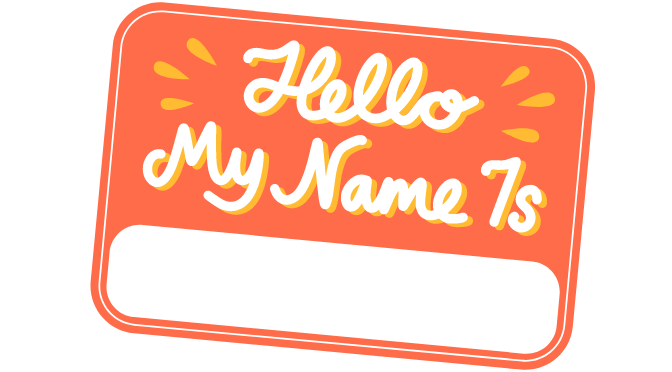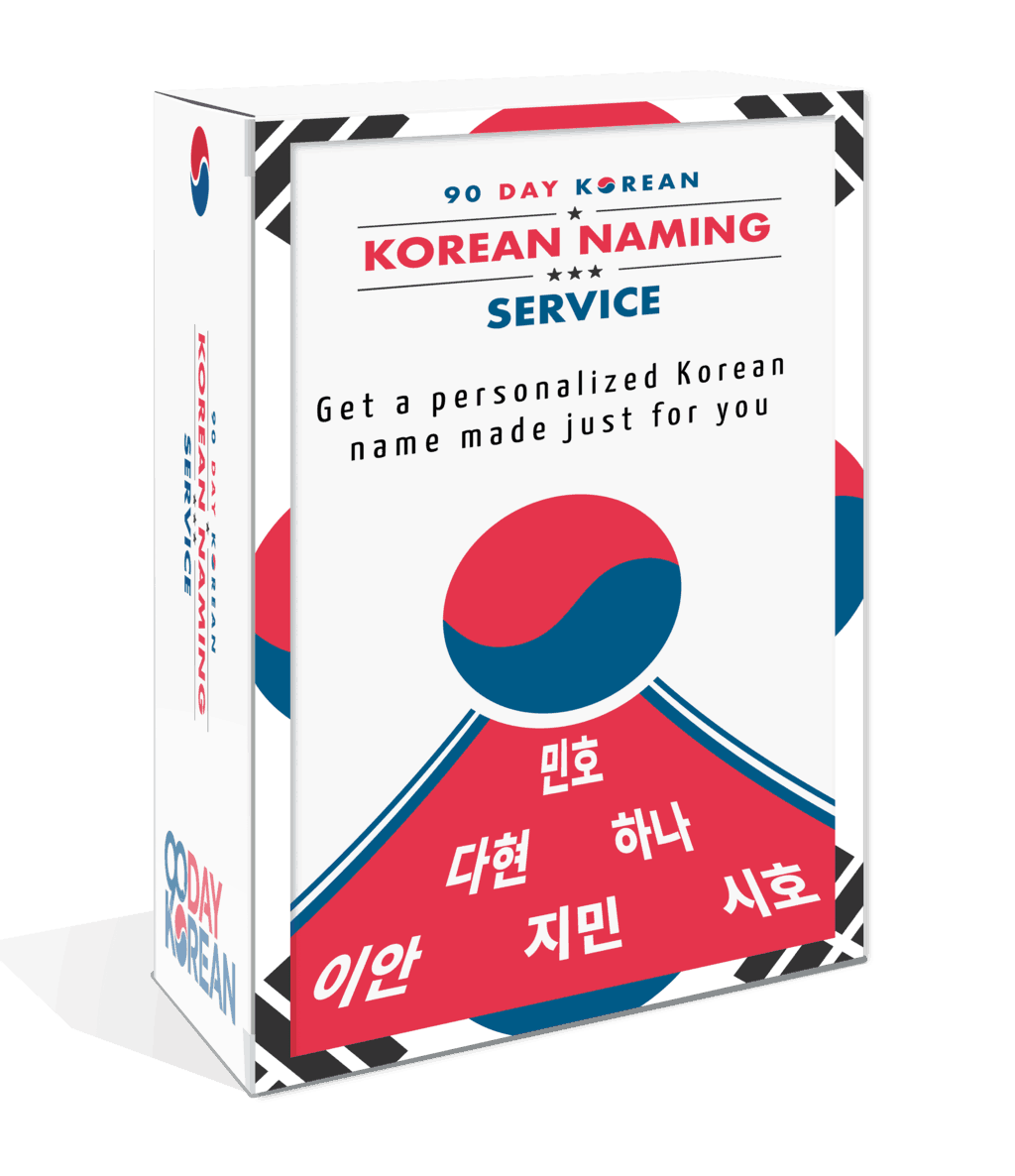We’re going to show you how to make a Korean name for yourself. Take a look at the six methods below, and choose the one that you like best!
If you’re looking for a professionally chosen name that fits your personality, then be sure to check out our Korean Naming Service.
Contents
Also, we’ve created a free PDF version of this post to take with you on the go. Use it in your search for the perfect name!
What is my Korean name?
As a visitor living or traveling in South Korea (or even living in your home country and interacting with Koreans), it’s easy to notice a barrier at times due to Korean cultural differences. Not to mention that many foreigners can have names that are very difficult to pronounce for Koreans.
Having a native-sounding name in Korean is a great way to break the ice and get started on the right foot. It adds just a little extra layer of comfort, and Koreans will have fun calling you by your new Korean name. These names sound familiar to them, so it’s a convenient way to get closer!
Even if you don’t know where to start, making a name in Korean is very worthwhile. You can really immerse yourself in Korean culture and improve your learning when you have your very own name.
How to get a Korean name
We have several methods of how to get a name in Korean below that you can use to create one.
Here’s a video that covers some of these methods.
If you learned something from this video, you can also subscribe to our YouTube Channel for other helpful videos on learning Korean!
Take a look through, try out the different methods, and hopefully, you’ll come out with a name in Korean you can start introducing yourself with starting tomorrow! Or just look at all the interesting names in Korea. Let’s get started!
Method 1: Write My Name in Korean
The first method you can use to make a name is not to make one at all! You can simply take your name and translate it into Korean based on the way it sounds. This is one of the most popular methods.
If you’ll be in South Korea for a longer period, you’ll notice that official documents will do this with foreigners’ names. Doing this is often an important step for new residents beginning their life in Korea.
While this isn’t a South Korean name per se, it is the first step you can take to make it easier for Koreans to pronounce and read your name. It makes them more comfortable trying to say your name, and that means they’re happier talking with you!
There are many situations when knowing your name’s spelling in Hangeul (the Korean Alphabet) will come in handy, so you should always study that first. If you don’t know the Korean characters, we can teach them to you fast with this post on the Hangeul (also spelled as Hangul).
When writing your name in Korean, it all comes down to vowel sounds. It’s important to sound out your name just right!
When you do this, sometimes English names with only a few letters can be a bit long in Korean. It can make for some pretty interesting-looking names when you see them in Korea! While you’re at it, writing your name in Korean can help you practice the correct Hangul stroke order too.
Let’s take the English name “Michael,” for example. First, we need to sound it out. Break down the name into its component syllables.
How about 아 (ah) + 이 (i)? That sounds right. Let’s add in the “m” sound in front of the, ㅏand we’ll be good to go!
First part: 마이 (Mai)
Now let’s focus on the second syllable. If you sound it out, it sounds more like “keul.”
As you may have learned from the 90 Minute Challenge, the Korean character that makes the “k” sound is ㅋ. It looks like a key! Let’s use that one.
The final step is to add in the “eul” sound. That’s easy! The Hangul character that makes the “eu” sound is ㅡ, and the “l” ending we can make with ㄹ. Let’s stack them together.
Second part: 클 (keul)
There we have it, we’re all finished! We ended up with our name spelled like this:
마이클
This comes out to sound like “mai-keul“. Sometimes, you’ll have to approximate the closest sound for your name.
Let’s take a look at some more common English names for South Korean women and men as examples:
| Korean Names for Boys | Korean Names for Girls |
| Joseph (조셉) | Jenny (제니) |
| Peter (피터) | Amanda (아만다) |
| Tom (톰) | Sarah (사라) |
| Steve (스티브) | Angela (앤젤라) |
Go ahead and give it a try yourself! Break your English name into syllables. Work on deconstructing your name piece by piece.
There are also lists online that may have your name written out in Korean (if you have a common name).
If you know any South Korean native speakers, you can also check your spelling with them. Even if your name isn’t common enough to be on a list, it may already be established in Korean, and you don’t even know it!
Method 2: Use a Korean Name Generator
There are some Korean name generator applications and websites out there that can help you come up with a name of your own.
Some of these name generators use your real name to help create similar-sounding South Korean names. There are some name generators that use your birthday to create your name in Korean. Others seem to come up with a name at random — when you refresh the page, you’ve got a completely different name!

We don’t strongly recommend using Korean name generators because of the reasons above. What you get from the Korean name generator doesn’t necessarily have a deeper meaning to you. It just generates a common name.
However, you never know — you might just get a great-sounding name in Korean that suits you. Or, at the very least, it could be a good starting point for getting a name in Korean if you’re stuck.
For example, maybe you get a Korean first name you like, but the Korean family name sounds strange to you. You could simply customize it yourself by swapping out the family name and putting in a common family name in Korea of your choice.
Korean Name Generator Websites
Here are a few Korean name generators that can be fun to play around with:
AndKPOP’s Get Your Korean Name Facebook Application
Method 3: Choose From a List of Korean Names
Maybe choosing random names with the click of a button is not for you. Not to worry, there are other ways to continue your search! We have a separate article with a list of common names in South Korea. You can use this as an inspiration for the Korean name that you want for yourself.
Most of the time, when South Koreans choose English names, they often choose the names of English-speaking stars that they admire.
Maybe you have a favorite K-pop star or South Korean actor. Think of which South Korean actor, South Korean rapper, South Korean singer, or star is the best for you, and you can start to get ideas for some names from them!
For example, here is a list of the members of the popular Korean idol groups BTS (male) and BlackPink (female):
| BTS (male names) | |
| 김석진 | Kim Seok-jin |
| 민윤기 (슈가) | Min Yoon-gi (Suga) |
| 정호석 (제이홉) | Jung Ho-seok (J-Hope) |
| 김남준 | Kim Nam-joon |
| 박지민 | Park Ji-min |
| 김태형 (뷔) | Kim Tae-hyung (V) |
| 전정국 | Jeon Jung-kook |
| Black Pink (female names) | |
| 김지수 | Kim Ji-soo |
| 김제니 | Jennie Kim |
| 박채영 (로제) | Park Chae-young (Rosé) |
| 리사 | Lisa (Thai) |
Of course, you probably don’t want to take their full names, including family names (imagine meeting a Korean who introduced himself as “Tom Cruise!”), but you could easily switch out to unique Korean names of your choosing.
As you may have noticed, many South Korean names are gender-specific. While there are some names that are unisex, most names can be considered more masculine or feminine depending on how they’re made up. Using a list is a good way to get a sense of common names at the moment.
Korean Boy Names
If you’re looking for male names, here is a list of the most popular Korean names for boys from 2018 and 2017 in South Korea:
| 서준 | Seo-joon |
| 하준 | Ha-joon |
| 도윤 | Do-yoon |
| 시우 | Si-woo |
| 지호 | Ji-ho |
| 민준 | Min-joon |
| 예준 | Yae-joon |
| 주원 | Joo-won |
| 은우 | Eun-woo |
| 서진 | Seo-jin |
| 유준 | Yoo-joon |
| 준우 | Joon-woo |
Korean Girl Names
Here is another list of the most popular Korean baby girl names from 2018 and 2017 in South Korea. If you’re planning to have a baby soon, check out this list when you need to decide on a name!
| 하윤 | Ha-yoon | ||
| 서윤 | Seo-yoon | ||
| 서연 | Seo-yeon | ||
| 하은 | Ha-eun | ||
| 지유 | Ji-yoo | ||
| 지안 | Ji-an | ||
| 서아 | Seo-ah | ||
| 하린 | Ha-rin | ||
| 수아 | Su-ah | ||
| 지우 | Ji-woo | ||
Most Common Korean Last Names in South Korea
South Korean family names or last names are not as many or as varied in South Korea as those you’ll find in other countries. The father’s surname or last name is passed down to their children. However, interestingly enough, their wives often keep their surnames.
The top 3 Korean last names (Kim, Lee, and Park) are by far the most popular and make up the vast majority of last names in South Korea. Check out this list of popular Korean surnames:
| Popular Last Names in South Korea (with frequency) | ||
| 김 | Kim | 10 million+ people |
| 이 | Lee | 7 million+ people |
| 박 | Park | 4 million+ people |
| 최 | Choi | 2.5 million+ people |
| 정 | Chung | 2 million+ people |
| 강 | Kang | 1 million+ people |
| 조 | Cho | 1 million+ people |
| 윤 | Yoon | 900,000+ people |
| 장 | Chang | 900,000+ people |
| 임 | Lim | 800,000+ people |
More Lists of South Korean Names
If you need more inspiration, here’s a link to lists of common names in South Korea you can search through.
You can see which names parents choose most often. Maybe this search will turn up one that suits you!
Just make sure you note the gender that the name is usually associated with since that can impact your first impression.
Method 4: Choose a Name That Sounds Like My Own Name
Another method for choosing a name in Korea is finding one that sounds like your native name.
This may require some help from a South Korean native, but you can use the name lists and other resources to try for yourself.
For example, maybe your name is “Kimberly Johnson.” Through the name lists or with the help of a friend, you come up with the following name:
김지선 = Kim Johnson
김 = sounds like “Kim”
지선 = sounds like “Johnson”
Some Korean learners may wish to choose a Korean last name that sounds similar to their given name in English! One member of our program named Joe chose the family name 조 (Cho) when making his name. He then just chose a modern and cool-sounding first name in Korea.
Be creative!
Method 5: Pick A Korean Name With A Special Meaning
This method for choosing one’s own Korean name may also require some assistance from a South Korean native friend, but it’s a great way to come up with a name that has a story or meaning behind it versus an arbitrarily chosen name.
Some names have special meanings. Some can be interpreted as “graceful gem,” “loving daughter,” “noble daughter,” “charitable and noble person,” “beautiful flower,” and many more! For example, these common names have the following meanings:
Korean Girl’s name: 은하 galaxy
Korean Girl’s name: 지혜 grace
Korean Boy’s name: 승리 victory
If you know a South Korean native, try asking them to help you come up with a name that has a special meaning in Korea. Don’t have native-speaking friends? There are easy ways to make friends whether you’re in or outside of South Korea.
Since some names are of Chinese origin, many Koreans also care about a name’s meaning in Chinese characters, and most of them use names that are Sino-Korean. This means added research, but it can help you come up with a great name that is very meaningful.
Remember how we said South Korean-given names usually have three syllables?
Try looking up the meaning of each Hangeul syllable in Chinese characters or have someone assist you. This would help you have a cool backstory for the meaning of your name in Korean and what it represents! Remember that most names in South Korea are Sino-Korean that use 한자 (hanja) or Chinese characters.
Method 6: Get A Korean Name Chosen By Professionals
90 Day Korean has a special paid naming service that will help you get a personalized name in Korean that is the best match for you.
When you purchase the service, you’ll take a short 15-minute course that will teach you the important elements of a Korean name. Then, you’ll fill out a short questionnaire about your background. Once you’re done, the Korean naming team will get back to you with some name choices to fit your background and personality.
How to write my name in Korean
If you want to change your English name to Korean, you need to sound out each syllable in your name.
Let’s say your name is Gina.
The first sound is “G,” which is best matched to ㅈ. Next, we’ll need the ㅣ for the “I” sound. We’ve got 지.
For the second syllable, we’ll need the ㄴ for “N.” Finally, “A” is best represented by ㅏ.
Here is how we map the English letters to Korean letters:
- G – ㅈ
- I – ㅣ
- N – ㄴ
- A – ㅏ
Gina = 지나
Write my name in Korean example
Keep in mind that the number of syllables may not match. For example, if your name is 1 syllable in English, then it’s possible that it’s 3 syllables in Korean. Let’s take a look at the name Chris as an example.
If you start to sound out Chris, you’ll need to start with ㅋ. The next best match syllable would be ㅡ. The first syllable is 크.
Next, we need the “R” sound. The best Korean letter is ㄹ. We’ll need a vowel, and the best match for “I” is ㅣ. The second syllable is 리.
The final sound is “S”, so we’ll need ㅅ. Since all Korean syllables must have a vowel, we’ll use ㅡ at the end.
In this case, the English to Korean will look like this:
- Ch – 크
- Ri – 리
- S – 스
Chris = 크리스
The name Chris is 1 syllable in English but three syllables in Korean!
Using your Korean name
Regardless of which method you choose for coming up with your South Korean name, it’s important to get feedback. Having a trusted ally on your side can make all the difference in the world to choosing the right-sounding name in Korean.
Run your name by any South Korean friends you may have or even those with some knowledge of Korea. You can also ask Koreans on your next trip to South Korea, it can be a great conversation starter.
Practice with your Korean name
We hope this will help get you off on the right track. Start by writing your English name in Hangeul. Then try coming up with a more native-sounding name.
Once you have a name in Korean, you use it when you introduce yourself in Korean. It’s an easy way to get started speaking Korean. Eventually, you can also master writing your name in Hangeul. Then you can level up by writing Korean sentences with your name on them.
Wrap Up
With your new name in hand, you’re ready to get fully immersed in Korea’s culture! If you have already selected one for yourself, how about choosing a name for your pets too? Here’s an article dedicated to Korean pet names.
Happy Korean naming!
Image Credit: Bigstock










Hello, how would I write Faridat?
Hello, you can write 파리닷. If the ‘t’ is silent, you can write 파리다.